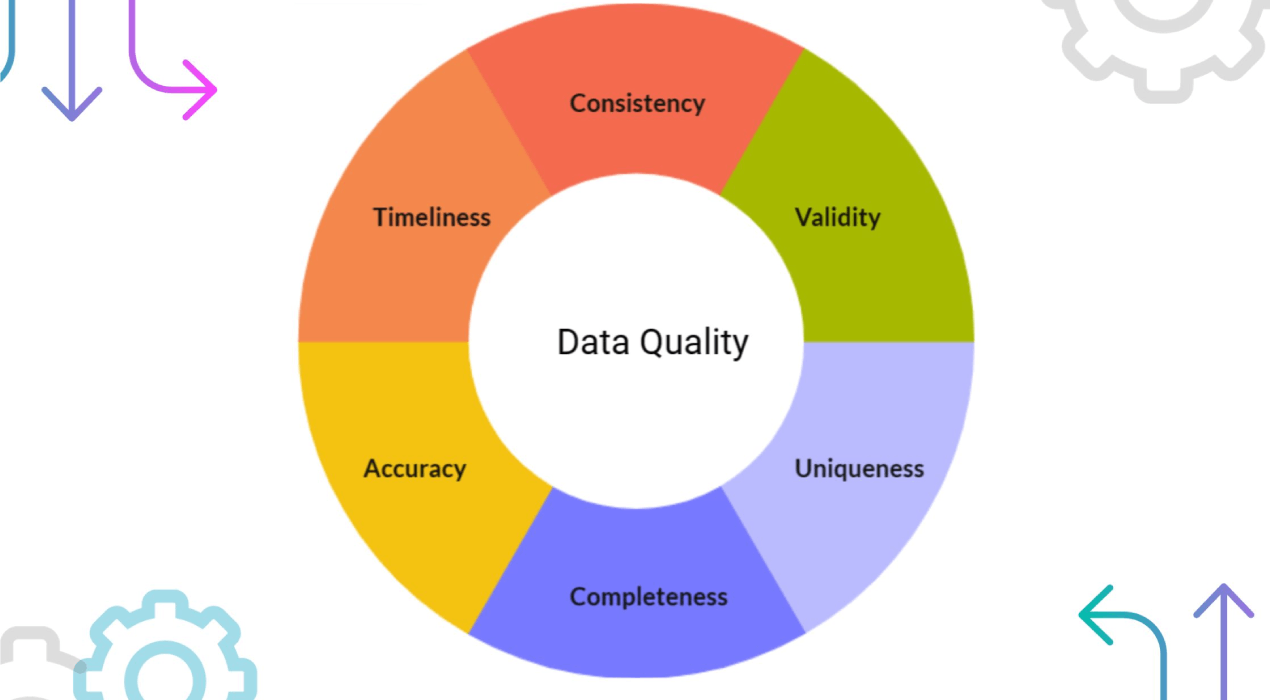
Experience the full features of the platform and discover the benefits it can bring to your organisation.
by submitting this form you agree to our privacy policy.
Experience the full features of the platform and discover the benefits it can bring to your organisation.
by submitting this form you agree to our privacy policy.

At its essence, data quality pertains to the level of excellence exhibited by data in serving its purpose, especially in terms of accuracy, completeness, timeliness, and relevancy [1]. In the manufacturing arena, this translates to having reliable information on raw materials, finished products, machine efficiencies, lead times, and more.
01
Optimized Production:
Data drives decision-making. With accurate data, manufacturers can enhance production schedules, reduce waste, and increase overall productivity.
02
Cost Efficiency:
Errors in data can lead to costly mistakes, such as overproduction, equipment malfunctions, or procurement issues. Accurate data keeps operations lean and cost-effective.
03
Supply Chain Management:
Reliable data is the backbone of an efficient supply chain. It aids in coordinating with suppliers, understanding demand and supply variables, and ensuring timely deliveries.
04
Risk Mitigation:
From ensuring regulatory compliance to predicting machine breakdowns, accurate data plays a crucial role in preempting and managing risks.
05
Enhanced Customer Satisfaction:
Timely and accurate deliveries, adherence to quality standards, and the ability to handle custom orders are all contingent upon high-quality data.
Perhaps, nowhere is the importance of data more pronounced than in managing parts inventory. Here's why accurate parts inventory data is fundamental:
01
Avoiding Stockouts:
Running out of essential parts can halt production, leading to delays, unfulfilled orders, and dissatisfied customers. Accurate inventory data ensures that manufacturers are always stocked with the necessary components.
02
Optimizing Storage Costs:
Overstocking parts ties up capital and increases storage costs. With precise data, manufacturers can strike the right balance, ensuring they neither overstock nor understock.
03
Forecasting & Planning:
Accurate parts inventory data aids in forecasting future demand, allowing manufacturers to plan production schedules, negotiate with suppliers, and manage resources efficiently.
04
Reducing Waste:
Knowing exactly what's in inventory prevents ordering parts that might already be in stock but unnoticed due to poor data quality.
05
Operational Agility:
In an industry where changes can occur rapidly, having a clear insight into parts inventory equips manufacturers with the agility to pivot their operations as needed.
01
Operational Delays:
Misinformation can halt production lines, disrupt schedules, and result in missed deliveries.
02
Increased Costs:
Inaccurate data can lead to unnecessary purchases, storage costs, and wasted resources.
03
Reputational Damage:
In an era of instant reviews and feedback, operational mistakes stemming from poor data can tarnish a manufacturer's reputation.
04
Reduced Competitiveness:
Manufacturers relying on poor-quality data will find themselves outpaced by competitors harnessing the power of accurate, actionable data.
Recognizing the importance of data quality is one thing; achieving it is another. Here are some steps manufacturers can take:
01
Invest in Technology:
Modern Enterprise Resource Planning (ERP) systems and inventory management software often come equipped with tools to validate and maintain data quality.
02
Regular Data Audits:
Periodically reviewing and cleansing data can identify inconsistencies, outdated information, and errors.
03
Training & Development:
Empower employees with the necessary skills and tools to recognize and rectify data quality issues.
04
Collaborate with Suppliers:
Regular communication with suppliers can help in updating and validating parts inventory data.
05
Feedback Mechanisms:
Create channels for floor managers, machine operators, and other staff to report discrepancies and provide feedback on data accuracy.
In the sprawling expanse of the manufacturing industry, data stands as the beacon guiding operational efficiency, strategic planning, and customer satisfaction. While the importance of data pervades every facet of manufacturing, maintaining accurate parts inventory data emerges as a non-negotiable aspect. After all, in the symphony of manufacturing, every part, no matter how small, plays a critical role, and knowing exactly where and when it's needed can make all the difference.
01
Wang, R. Y., & Strong, D. M. (1996). Beyond accuracy: What data quality means to data consumers. Journal of Management Information Systems, 12(4), 5-33.
02
Gunasekaran, A., Patel, C., & McGaughey, R. E. (2004). A framework for improving data quality in manufacturing
In the intricate web of the manufacturing industry, data stands as the linchpin, ensuring smooth operations, timely deliveries, and optimized production processes. Among the myriad of data elements, maintaining an accurate parts inventory emerges as one of the pivotal facets. This article illuminates the paramount importance of data quality in the manufacturing sector, highlighting why it's not just a best practice, but a necessity for modern manufacturers.
Full setup within 24 hours.
Experience the full features of the platform and discover the benefits it can bring to your organisation


